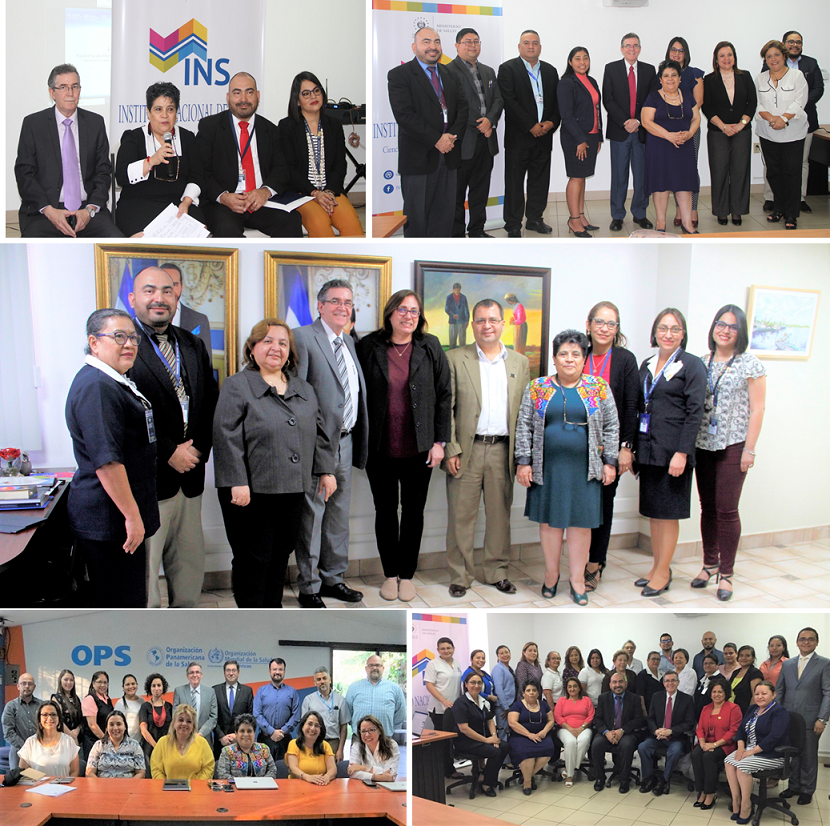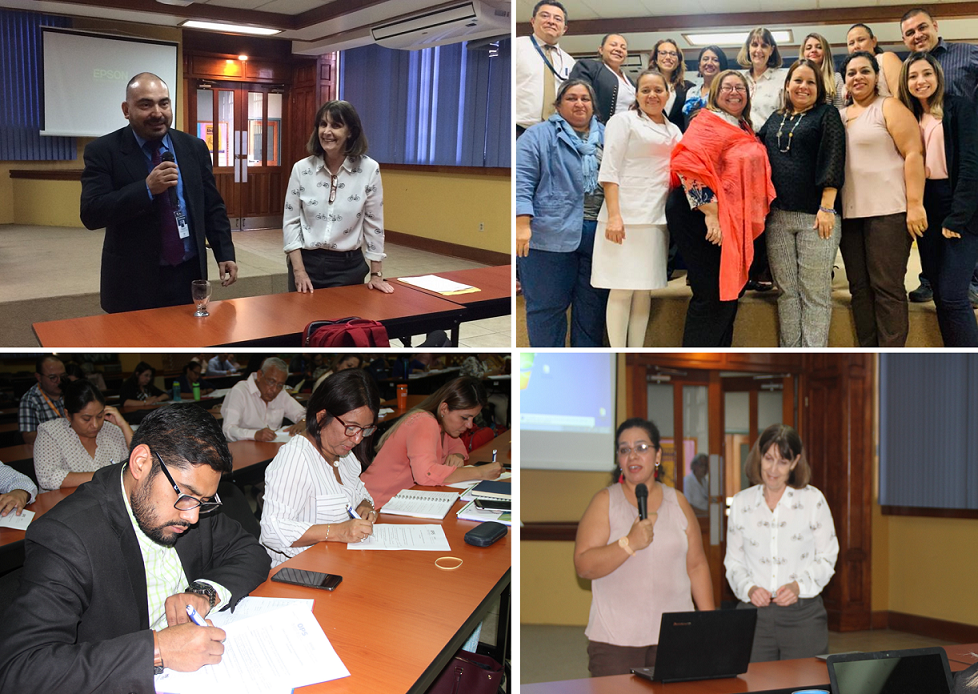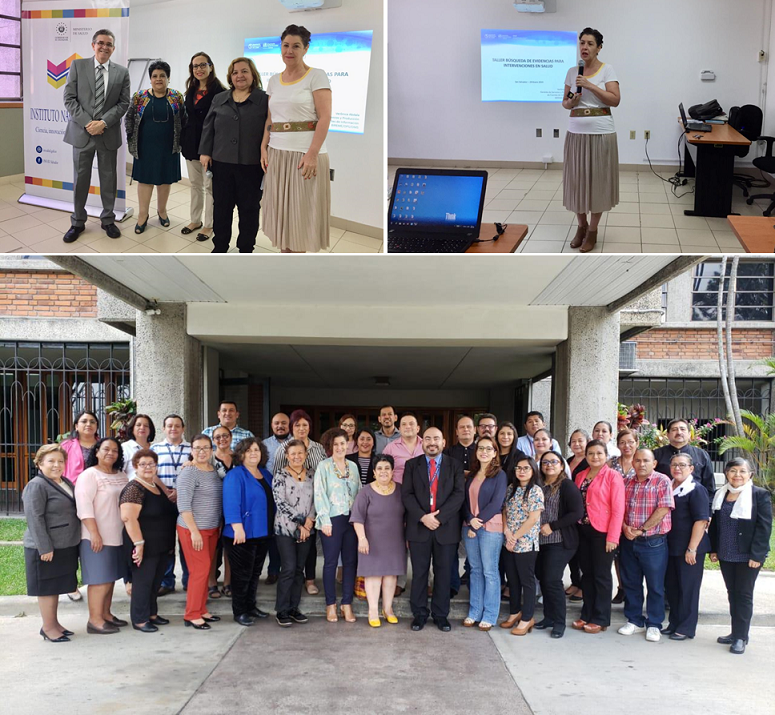At the initiative and leadership of the Ministry of Health of El Salvador, through its National Institute of Health, in collaboration with PAHO/WHO in the country and with BIREME, between January 27th and 31st, an intense week of activities, meetings and workshops with representatives of academic, governmental and scientific associations was held, with the main objective of reorganizing the National Documentary Health Information Network (RENIDS) and reactivating the Virtual Health Library (VHL) in the country.
This action is also contextualized in the fact that El Salvador is a member of one of BIREME’s Governance Committees, the Advisory Committee, which meets once a year to offer recommendations aimed at the institutional strengthening of the Center, through the analysis of its Biannual Work Plans (BWP) and its products and services for management of scientific information and communication for the countries of the Region. El Salvador’s INS was represented at the 2018 and 2019 sessions.
Diego González, Director of the Center, Lilian Calò, Coordinator of Scientific Communication, and Verônica Abdala, Manager of Information Sources, participated in the mission. The Director of BIREME was mainly dedicated to strategic meetings with Primary Care Managers from the regions of the country and from the Basic Comprehensive Health System (SIBASI), in addition to the General Directorate of Technology Training and Public Management of the Innovation Secretariat of the Presidential House, Rector of the Faculties of Medicine, Presidents of Scientific Associations and Societies and Faculty of Medicine, nursing staff and with the technical and administrative team of PAHO/WHO El Salvador.
 These meetings aimed to publicize BIREME’s products and services in scientific and technical health information, as well as to identify which of them could integrate the country’s Digital Health Agenda, such as the Second Formative Opinion – SOF, VHL Infobutton, and the eBlueInfo application. Dr González highlighted the online courses on Access to Scientific Information and Scholarly Communication, which are available in Spanish at the Virtual Campus for Public Health.
These meetings aimed to publicize BIREME’s products and services in scientific and technical health information, as well as to identify which of them could integrate the country’s Digital Health Agenda, such as the Second Formative Opinion – SOF, VHL Infobutton, and the eBlueInfo application. Dr González highlighted the online courses on Access to Scientific Information and Scholarly Communication, which are available in Spanish at the Virtual Campus for Public Health.
One of the proposals discussed would be that students take courses online in exchange for academic credits. The training of students in health courses on these topics aims to improve the search for qualified information and increase the publication of research reports in the clinical field, among others.
In addition to the meetings, three training workshops were held, with wide participation of information and health professionals. With the objective of strengthening health research and ethics to advance towards universal health, in addition to providing solid methodologies and techniques for health research teams and networks, Lilian Calò, administered, on January 26th and 27th, a face-to-face course in scientific communication for 50 participants, including researchers, health professionals, professionals involved in the management of scientific journals, graduate students and other interested parties.
 A prerequisite for the course was to take the online course available at CVSP. Emerging themes in scientific communication such as preprints, predatory journals and the international trend to adopt open science practices were presented and discussed with the participants. According to Dr. Calò, “The important thing is not that everyone agrees with the new open science methodologies, such as open peer review or the publication of preprints, but that they are aware of these trends and have a critical opinion about them.”
A prerequisite for the course was to take the online course available at CVSP. Emerging themes in scientific communication such as preprints, predatory journals and the international trend to adopt open science practices were presented and discussed with the participants. According to Dr. Calò, “The important thing is not that everyone agrees with the new open science methodologies, such as open peer review or the publication of preprints, but that they are aware of these trends and have a critical opinion about them.”
Two other workshops were conducted by Verônica Abdala, one for access and search for information in the VHL for librarians and researchers, with the presence of 25 participants and another on the Virtual Health Library – model of information management for the countries of AL&C, with the participation of representatives from 27 academic and government institutions in El Salvador. The main objective of this last workshop, held on January 31st, was the reorganization of the National Health Documentary Information Network (RENIDS), presentation of the main tools and methodologies offered by BIREME for bibliographic control and development of a new VHL Instance in El Savior.
 As a result, the network of cooperating centers was reactivated, courses of action were defined, and a matrix of responsibilities was established. INS assumed the National Coordination of the Network and the Faculty of Medicine of the University of El Salvador, the Technical Coordination of the Network (http://red.bvsalud.org/es/el-salvador/). “The success of the work of the newly reactivated Network”, says Veronica Abdala, “depends on the continuous monitoring and support of BIREME, whether through virtual meetings, guidance through e-mail and support from the technical staff of the Center. Furthermore, it is essential to establish a collaborative flow for bibliographic control at LILACS and to verify conditions for the creation of a national database ”.
As a result, the network of cooperating centers was reactivated, courses of action were defined, and a matrix of responsibilities was established. INS assumed the National Coordination of the Network and the Faculty of Medicine of the University of El Salvador, the Technical Coordination of the Network (http://red.bvsalud.org/es/el-salvador/). “The success of the work of the newly reactivated Network”, says Veronica Abdala, “depends on the continuous monitoring and support of BIREME, whether through virtual meetings, guidance through e-mail and support from the technical staff of the Center. Furthermore, it is essential to establish a collaborative flow for bibliographic control at LILACS and to verify conditions for the creation of a national database ”.
It should be noted that the magazine Alerta, a publication of the INS, will be the first periodical in the country to be indexed in the LILACS database, since it met the required quality criteria.
In a meeting with the Vice Minister of Health, Dr. Alvarenga, and the director of INS, Dr. Xochil, the director of BIREME emphasized the achievements, such as: the dissemination of BIREME products and services to different audiences, contributing to training with the adoption of face-to-face and self-learning courses in scientific communication and access and use of health information, identification of VHL cooperating centers, with a work plan to reactivate the national VHL and increase the quality of Alert magazine, which now meets the criteria to be indexed in LILACS.
BIREME’s mission to El Salvador was considered, both by the institutions and by the PAHO Representation of El Salvador, to be successful and an important step in strengthening its research and communication at the national, regional and global levels.